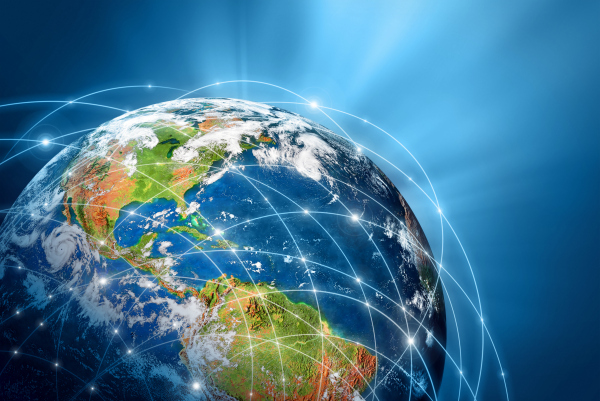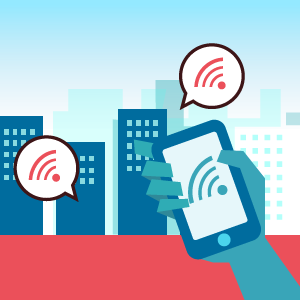
In this increasingly connected age, many of us take access to the Internet for granted, as 85% of Americans over the age of 18 now have access to the Internet and 70% of adults have high-speed Internet in their homes. That doesn’t mean that all Internet is created equal, though. Where you live can have a huge influence on not only your access to high-speed Internet, but also how much it will cost.

Paste this Image on Your Site!
Simply copy and paste the code below and you can share this infographic on your site:
[fdembed]
More and more municipalities are creating large-scale Wi-Fi networks for free in towns and cities across the US, offering users an unprecedented level of connectivity. Here’s a look at some of the fastest, slowest, most expensive and downright free Internet connections you’ll find in the US.
Not All ISPs Are Created Equal:
First introduced in Kansas City, Missouri, Google Fiber is the bullet train of the Internet scene, with a download speed average of 190.45 Mb/s, which blows the national average speed of 8.6 Mb/s clear out of the digital water.
Not to be outdone, AT&T has announced a substantial expansion of its U-Verse network, but with an average download speed of just 28 Mb/s, it scarcely even compares.
Still, the US has a long way to go in terms of Internet speed, cost and coverage. In a recent study, published by the New America Foundation’s Open Technology Institute, called “The Cost of Connectivity,” US cities failed to crack the top five in terms of global cost and top speed:
-
Seoul, South Korea: 1 Gb/s for $31.47 USD/month.
-
Tokyo, Japan: 1 Gb/s for $31.69 USD/month
-
Hong Kong, China: 1 Gb/s for $44.89 USD/month
-
Riga, Latvia: 500 Mb/s for $97.99 USD/month
-
Amsterdam, Netherlands: 500 Mb/s for $86.00 USD/month
Farther down on this list, the US cities that cracked the top 10 are Kansas City, Kansas, and Kansas City, Missouri, both of which have the benefit of being Google Fiber-equipped, but are comparatively pricey at roughly $70 a month for comparable speed.
Still, this doesn’t mean that there isn’t value to be found in the US marketplace when it comes to affordable high-speed Internet. The following cities are the top 10 in the US when it comes to bang for your buck. With average monthly costs of around $35 and a speed averaging around 60 Mb/s, the residents of these locales are the lucky ones.
-
San Francisco, California: 100 Mb/s for $37.50
-
New York, New York: 50 Mb/s for $34.99
-
Washington, District of Columbia: 50 Mb/s for $39.99
-
Bristol, Virginia: 30 Mb/s for $30.99
-
Los Angeles, California: 30 Mb/s for $37.49
-
Chattanooga, Tennessee: 25 Mb/s for $39.99
-
Lafayette, Louisiana: 15 Mb/s for $34.95
-
Kansas City, Kansas: 15 Mb/s for $34.99
-
Kansas City, Missouri: 15 Mb/s for $35.99
-
Austin, Texas: 60 Mb/s for $39.99

The fact remains that in the Internet age, the “Holy Grail” is and always will be free Wi-Fi. As to which cities make the cut in terms of the most coverage is a highly contested topic. Even though a city like Denver, Colorado, boasts having more than 180 free Wi-Fi hotspots — including a mile-long ‘corridor’ of free connectivity along its main drag — it still can’t compete with the New York City borough of Harlem, which will soon have 100 city blocks with blanket coverage. And though that may be the single largest continuous Wi-Fi network in the US, it will nevertheless have to square off against the reigning ‘Most Connected City,’ which Forbes has awarded to Raleigh, North Carolina, for the last three years running. The Southern city consistently outranks more major metropolises when it comes to broadband connectivity, penetration and number of free Wi-Fi hotspots, though on a state level, it still can’t hold a candle to California, which boasts a nation-leading 15 large-scale Wi-Fi networks.
Ultimately, the world of high speed Internet is changing. Already the Federal Communications Commission has invited an open debate on exactly what constitutes ‘high speed’ or ‘broadband’ Internet, and given the speeds discussed earlier in this article, the current definition of 4 Mb/s is almost laughable. Still, you can be certain that no matter what city you live in, it’s inevitable that the speed, quality and availability of your Internet connection is on the rise.
[cf]skyword_tracking_tag[/cf]

